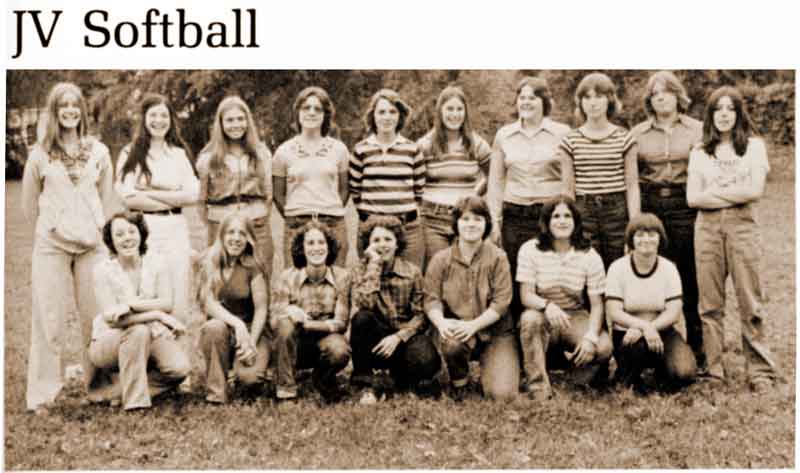The front page of Sunday’s Kennebec Journal had a sweet coincidence: Right above a story about the 40th anniversary of Title IX was a photo of the Cony High School softball team celebrating its state championship.
Sweet, indeed.
(The story, without a photo, was on page C1 of Sunday’s Morning Sentinel.)
I played softball for Cony, too, on the junior varsity team my sophomore year. But the gap between me and those girls is way more than the 34 years between us.
A picture in the 1977 Cony yearbook says it all: We’re not in uniform — not because we didn’t know it was picture day, but because we didn’t have uniforms. The ill-fitting polyester blouses and trousers we’re wearing are what we played in, topped by ancient knit field hockey vests too rank for even the field hockey team to use and too ugly for us to model for the photo.
Our names aren’t listed; instead there’s a caption: “It was a year of experience for the JV softball team being its first year in existence. This team, coached by Miss Choate, was young and all are looking forward to a rewarding season next year.”
I don’t remember our record, but I know it was short on wins. We rarely had even one spectator. We played on rocky, unkempt fields that often didn’t have baselines, or sometimes even bases. I played second base and remember charging a grounder, a sure out — until the ball got stuck in a patch of muddy snow. An easy single.
That 1977 yearbook describes many of the girls’ teams as “young.” I’m guessing the sudden bloom of girls’ teams was a result of Title IX, but I don’t know if I even knew it existed. I was just happy to be there. Most of the other girls in the picture look like they are, too. Why not? We finally had a team to play on and the future could only get better — looking forward to decades of rewarding seasons to come.
Title IX came crashing into my consciousness the fall of 1978, when I was visiting my sister, a freshman at Holy Cross, and tagged along as she did interviews for a school magazine on the state of Crusader sports.
The one clear memory I have of that weekend is the captain of the volleyball team crouched against the wall in the hallway of her dormitory, talking with an intensity I can still feel across the decades. She was passionate, angry and proud, and I realized that the unfairness I’d felt for years had a voice much stronger than my own.
That voice came to mind frequently when I was sports editor of the New Hampshire Union Leader from the mid-1990s and on and off until 2011. The conversation about Title IX had stalled and every time a woman filed a lawsuit or a college dropped its baseball team, wrestling team, or — God forbid — football team, someone would say, “blame Title IX.”
I can’t count the times I defended it over the decades. Don’t blame Title IX, I’d tell the guys, blame the school’s priorities. But that’s a tough leap of logic, even in 2012, for people to make.
When I was a kid and wanted to do something “girls didn’t do,” I was sometimes asked, “Why do you want to be a boy?”
I hope that question isn’t asked much anymore, but the argument whenever there’s a Title IX complaint is philosophically the same:
Women’s sports don’t make as much money for the schools. Scholarships going to girls who aren’t that good mean there are fewer for boys who are. Men’s sports are harder and take more effort, so deserve more compensation. When a men’s team is cut, talented men can’t play sports they’ve been playing all their lives.
I wish every 17-year-old girl in 2012 could have a moment like I did in that beer-soaked, noisy Holy Cross hallway and hear that volleyball captain pour out her frustration, but with a determination and passion that still makes it a vivid memory 34 years later. It makes a lie out of all those arguments for rolling back women’s opportunities.
It’s a far different world for today’s young women, but many of the challenges of getting fair treatment, or even the basics, still exist.
My generation is luckier in some ways. We got to be part of the fight, and we have the strength that comes from having to struggle for something and defend it. There’s a special knowledge that comes with that.
Let’s hope the girls celebrating on the front page of last Sunday’s KJ, with a lifetime of rewarding seasons unfolding ahead of them, can hear what those ragtag girls in the polyester shirts have spent decades getting the world to know.
Maureen Milliken of Belgrade is night news editor of the Kennebec Journal and Morning Sentinel.
Send questions/comments to the editors.



Success. Please wait for the page to reload. If the page does not reload within 5 seconds, please refresh the page.
Enter your email and password to access comments.
Hi, to comment on stories you must . This profile is in addition to your subscription and website login.
Already have a commenting profile? .
Invalid username/password.
Please check your email to confirm and complete your registration.
Only subscribers are eligible to post comments. Please subscribe or login first for digital access. Here’s why.
Use the form below to reset your password. When you've submitted your account email, we will send an email with a reset code.